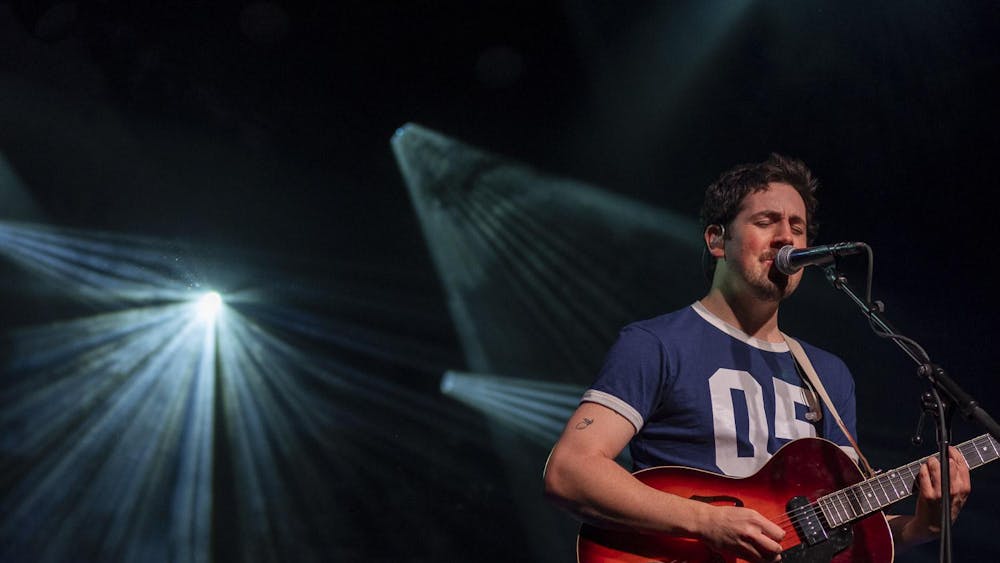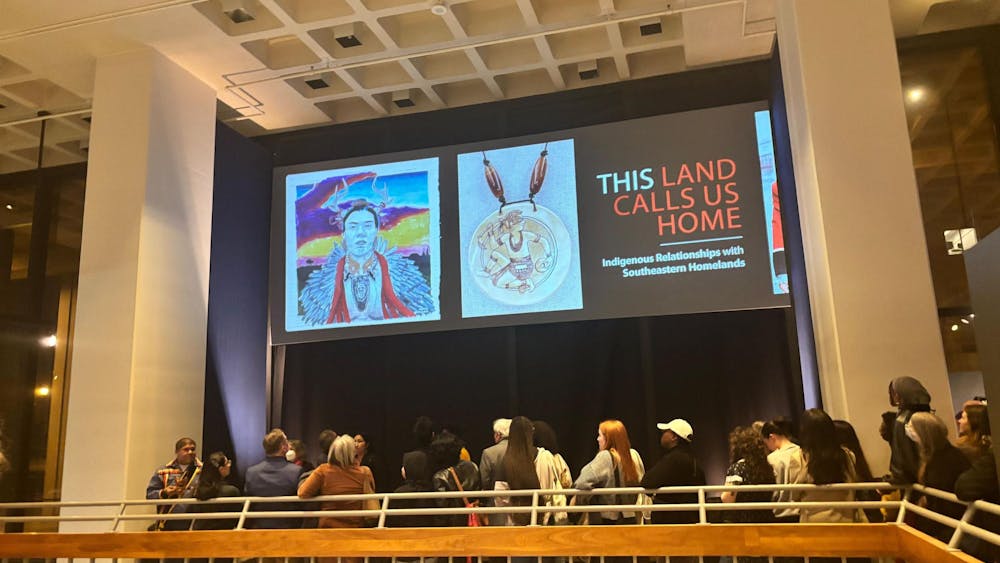Powerful ideas swept through Woodruff Health Sciences Administration Center on Feb. 27 at the sixth TEDxEmory event: The Beauty of Things Unseen. This conference brought together 12 speakers to share their stories with hundreds of audience members in the auditorium.
At TEDx events, either TED Talks videos are screened alone or in combination with live presenters with the intent to spark deep conversation and connections at the local level. TEDx events are planned and coordinated independently under a free license granted by TED.
Keys to a Successful TEDx event
According to TEDxEmory staff members, the key to holding a TEDx event capable of drawing a large audience is to create a continually growing network of speakers who will accumulate incrementally through every event held.
“We reached out to some speakers by contacting the five academic advisors for TEDxEmory and connected with other speakers through personal connections,” College junior Maggie Cherneff said.
Another key factor for a successful TEDx event is the attainment of sufficient funding, which, in this case, came from 12 Emory organizations and local businesses with whom TEDxEmory has cultivated a sustaining and supportive relationship such as the Office of the President, the Emory Student Government Association, Emory Alumni Association and Kaldi’s Coffee to name a few.
“We’ve established a solid foundation of sponsors throughout the past six years, because TEDxEmory can attract a large audience,” College junior and programming member at TEDxEmory Kavina Jani said.
According to Jani, settling on an interesting theme for the TEDx event also contributes to its success, but the process requires both time and creative ideas from the TEDxEmory team.
“The reason why we picked ‘Beauty of Things Unseen’ as the theme is because we wanted to create a context of thoughts that is open enough for people to craft their own understanding, but at the same time, targeted enough for people to think within the concept of hidden beauty,” Jani said.
The 12 speakers offered a feast of ideas on the topic of the beauty of things that people may not notice daily. The event was broken down into four different sessions, each in which three speakers, who shared a common approach to the material, presented their own thoughts. These topics ranged from the impact of music in daily life to the empowering experience as a woman in the high-tech field.
A compilation of inspiring talks
NPR Host and Master of Ceremonies Rickey Bevington opened the talks by explaining the theme and her response to it. She realized that “radio, by its [very] definition, is unseen” and elaborated with the story of an NPR interview of a NASA employee who had worked on the space shuttle Challenger that exploded during takeoff in 1986. Even though the listener had not seen the NASA employee, “they have their own picture of him in their heads — a clear picture that results from his story — and that is really cool.”
Session 1: Beauty unseen in storytelling
Daniel Horowitz, regional manager for StoryCorps in Atlanta
By sharing two archived interviews, one between two 90-or-more-years-old sisters and the other between a lesbian couple of color, Horowitz delivered his message to the audience that “it’s important to share your stories, but perhaps even more important to listen to the stories of others” to improve our lives.
Brandon Smith, founder of The Worksmiths LLC
Sharing his own story of loss with the audience, Smith used the example of his past traumatic experience of losing his brother when he was 10 as a way to emphasize how contagious emotions are communicated in workplace. Smith realized the impact of a boss’s emotions on that of their workers. “What’s most important is how you feel after spending time with your boss or coworkers,” Smith said.
Fadel Zeidan, Wake Forest assistant professor of neurobiology and anatomy
Zeidan shared his story of uncovering mechanisms involved in meditation and pain relief in his research. Zeidan has spent 15 years coming up with a meditation plan that spans four days for 20 minutes a day; he emphasizes mindfulness as the secret to succeeding in meditation.
“Not judging yourself and actively forgiving yourself for losing focus during meditation in order to allow yourself to come back to focus” allows for greater benefits, Zeidan said.
Session 2: Beauty unseen in delivering values
Jonathan Bertulis-Fernandes, Robert T. Jones Memorial Trust (Bobby Jones) Scholar
Bertulis-Fernandes shared how he overcame his stutter and the importance of standing outside of the comfort zone. He believes that the comfort zone is an artificial barrier which, for any individual who is determined to break it, will seem like it never existed. “If you constantly move from strange and familiar and then familiar to strange, you will notice that there is not much difference between the two,” Fernandes said.
Karen Lynn Anderson, director of Tiny Doors ATL
As an award-winning artist, Anderson created miniature public art installations which have inspired a community of fans who believe in free, accessible and experimental art. Anderson shared her mindset of bringing big wonder to tiny spaces. “Appreciate the moments that can make us feel transported, and tie together communities in Atlanta,” Anderson said.
Matt Pipkin, founder of Speak Your Silence (SYS)
For Pipkin, the beauty unseen is the truth that each human being is infinitely valuable “innately and there’s nothing that anyone can ever do to take away from it.” Pipkin felt it was important to find his own self value in the face of traumatic abuse as a child. It took 20 years for Pipkin to tell his parents. “We all need counselors; we all have them in one shape or another,” Pipkin said. His own experience shaped his role today as the founder of a non-profit on the mission to conquer the stigma around sexual abuse.
Session 3: Beauty unseen in careers
Zainab Ghadiyali, tech lead for advertiser growth at Facebook and co-founder of Goodmate
Proud of being a woman in the technology field, Ghadiyali shared her passion in computer science and data analysis. Her dedication to the high-tech field and data science made people rethink gender stereotypes. Through her talk, she aimed to pass on to audience the power of breaking career and gender barriers. “I encourage every woman in the [high-tech industry] to believe in her power of achieving success in the career,” Ghadiyali said.
Kenneth Carter, Oxford College professor of psychology
An expert in psychology, Carter unraveled the myth of the psychology of thrill seekers, who are sensation-seeking. According to Carter, those thrills include danger experience, disinhibition and boredom susceptibility. “Thrill seekers experience less stress and more pleasure in life because they can bear more pressure compared to others,” Carter said.
Carine McCandless, author of the New York Times bestseller The Wild Truth
As a self-driven entrepreneur, Carine shared how she empowers herself by pushing herself to be independent and rely on herself. “The greatest experience in my life so far is to jump outside of my comfort zone,” McCandless said. She also emphasized how she benefits a lot from remaining cautious around those who don’t learn from their mistakes. “The best thing you can do is to inspire people, because their DNA will not define them,” McCandless concluded.
Session 4: Beauty unseen in media and climate
Stephen Fowler, College senior at Emory University and executive digital editor at The Emory Wheel
Fowler drew everyone in the auditorium into a world in which storytelling is accomplished through music. “Music [uses] practically every human’s cognitive function,” Fowler said. He went on to share that when people listen to certain parts of music that stimulate emotion, they begin to crave the patterns in their brains. Integrating his personal experiences as a musician, Fowler stated that he firmly believes that “music breaks the barriers to communications.” At the end of his talk, Fowler invited the audience to create music for themselves — to become the composers of the soundtracks of their own lives.
Eddy Von Mueller, film and media studies senior lecturer
Mueller engaged the audience with his opening question: what makes people respond to images the way they do? “Looking at pictures is different from seeing the world, as the way we perceive the images involves different perceptions,” Mueller said. He went on to explain that “photography is a mechanical rather than biological experience,” as it acts as a sort of “truth-telling machine.” He ended with a reflection on how violence in American culture is reflected in Hollywood films.
Kim Cobb, Georgia Tech professor
Cobb shared the findings of her research which uses corals and cave stalagmites to probe the mechanisms of climate change. Her inspiring talk first pushed the audience to think intensely on the rapid change in climate, as massive corals die because of the rise in carbon concentrations in water. After the audience raised their hands in response to Cobb question — whether they felt disappointment, anger or powerlessness with regards to on-going climate change — she sought to empower everyone in the auditorium with the challenge to lower one’s carbon footprint in daily life. “Let’s not wait for the technical fix and the next president and Congress,” Cobb said. “Let’s take actions today.”
All the speakers, though they varied in terms of their professions and their presentation of the beauty unseen, engaged the audience with their empowering talks and sought to inspire people to pay more attention to the little things in life.





